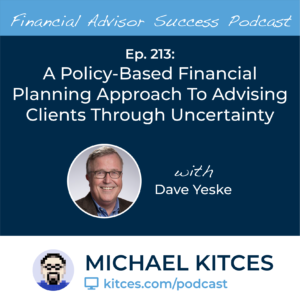The Registered Investment Adviser was established by the Investment Advisers Act of 1940, with an explicitly stated intention of separating “bona fide investment counselors” from the “unscrupulous tipsters and touts" trying to just sell the next hot investment scheme. Accordingly, from its very start, a key pillar in the regulation of investment advisers has been various prohibitions against any form of marketing or advertising that might be deemed ‘misleading’ to the public about the investment adviser’s anticipated investment returns. Which in 1961 was formally codified into an advertising rule that explicitly prohibited RIAs from using any form of client testimonial, under the auspices that the results and returns of any one client wouldn’t necessarily be representative of what any/all kinds could expect in the future… and that therefore testimonials were inherently misleading and a danger to the public.
In the years since, though, the world of marketing and advertising has evolved greatly, as have the services of RIAs themselves. As financial advisors expand into financial planning services beyond just portfolio management and are judged on the quality of their service beyond just the literal steps of managing the portfolio itself, it becomes harder and harder for consumers to evaluate an advisor’s quality and expertise with respect to the full breadth of their services. For which one of the most straightforward ways to assess is simply to ask other clients what their experience has been – a common approach in most industries that has led to a bonanza of various third-party review sites, from Google My Business to Yelp and more… but has remained remarkably absent from the realm of financial advisors due to the ongoing prohibition against client testimonials!
But now, the SEC has announced a new marketing rule – it’s first substantive refresh in nearly 60 years – which will, for the first time, allow financial advisors to proactively use testimonials (from clients), endorsements (from non-clients), and highlight their own ratings on various third-party review sites. Which means, simply put, that as the SEC’s new marketing rule takes effect in the coming months, it’s a new dawn for financial advisor marketing.
Not surprisingly, though, the SEC is not granting carte blanche permission for RIAs to use testimonials and endorsements however they wish. Instead, the new rules provide both a series of 7 general prohibitions that still apply to testimonials and endorsements (e.g., that they not be untrue or misleading regarding any material facts), a series of specific requirements that apply to testimonials and endorsements, from new required disclosures to additional oversight and compliance obligations regarding both the RIA and the “promoter” for the RIA, and certain limitations on who can even be a promoter providing an endorsement or testimonial in the first place.
In addition, the SEC’s new marketing rule provides additional clarity about when and how RIAs can leverage various third-party rating and review sites (e.g., Yelp, or various ‘Top Advisor’ lists), including a due diligence obligation (to affirm that the reviews had equal opportunity to be favorable or unfavorable) and additional disclosure requirements regarding the criteria used to determine the rating or review and what it actually pertains to (e.g., explicitly disclosing that a “Top Advisor” ranking is based on AUM alone doesn’t necessarily speak to the quality of the advisor’s advice).
Notably, though, the new marketing rule and its permissiveness of testimonials, endorsements, and the use of third-party review sites are technically only for SEC-registered investment advisers. Those RIAs that are registered at the state level will still need to conform to their state’s own marketing rules, which may or may not incorporate (or be updated for) the SEC’s new rule going forward. And FINRA-registered brokers are ultimately still subject to FINRA’s own rules on advertising and communications (not the SEC’s rules for RIAs).
Nonetheless, the reality is that the SEC’s new marketing rule represents a dramatic shift in the regulatory environment for RIAs when it comes to marketing and a recognition that when the business of advice goes far beyond just investment returns, testimonials and endorsements – and more generally, the perspective from those who have actually paid for and used the adviser’s services – can be an effective way to communicate the value the adviser brings to the marketplace. Albeit with the kind of (very reasonable) disclosures and compliance oversight that would still be expected to ensure that the adviser’s marketing is still reasonable and not misleading about the financial advisor’s services!

 Welcome back to the 214th episode of the Financial Advisor Success Podcast!
Welcome back to the 214th episode of the Financial Advisor Success Podcast! Welcome back to the 213th episode of the Financial Advisor Success Podcast!
Welcome back to the 213th episode of the Financial Advisor Success Podcast!
